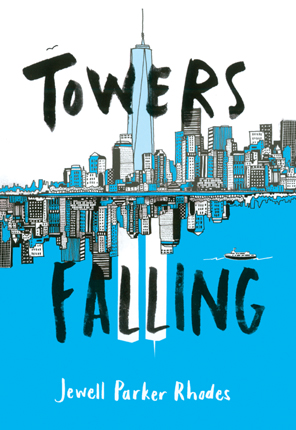| Towers falling Author: Rhodes, Jewell Parker | ||
| Price: $6.50 | ||
Summary:
While learning about September 11th, fifth grader Deja (born after the attacks) realizes how much the events still color her world.![]() Download a Teacher's Guide
Download a Teacher's Guide
| Accelerated Reader Information: Interest Level: MG Reading Level: 3.30 Points: 4.0 Quiz: 182917 | Reading Counts Information: Interest Level: 3-5 Reading Level: 3.40 Points: 8.0 Quiz: 68953 | |
Reviews:
Kirkus Reviews (04/15/16)
Booklist (04/15/16)
The Bulletin of the Center for Children's Books (06/16)
Full Text Reviews:
Booklist - 04/15/2016 Sure, moving from Brooklyn and into the Avalon Family Residence doesn’t sound that bad, but for Dèja and her family, it’s just a fancy way of saying that they live in a homeless shelter. The one good thing to come out of the move is that Dèja finally gets to go to a good school. Used to being a tough girl, she is quick to bristle, but two patient students—Sabeen, a Muslim, and Ben, a displaced country boy—soon win her over. Fifteen years after the September 11 attacks, their school strives to teach about the tragedy by focusing on ideas of home, interconnectedness, and what it means to be an American. Dèja, who has never heard about 9/11, is filled with questions, especially after her father grows inexplicably angry over her lessons. Rhodes excels at shining a meaningful, if teacherly, light on tragedy—as she did for Hurricane Katrina in Ninth Ward (2010)—and instructors and librarians will appreciate her sensitive but candid approach to the September 11 attacks, as well as her diverse cast of characters. - Copyright 2016 Booklist.
Bulletin for the Center... - 06/01/2016 Dèja senses that she should be relieved by her new situation: the shelter she and her family have moved into is a step up from living in their car, her new school is adequately funded and diverse (“In my old neighborhood, everybody was black”), her fifth-grade teacher is sensitive and welcoming, and her classmates are pretty nice. This, however, does nothing to change the fact that Mom is still overworked and underpaid, Dad is still sick in body and mind, and care of two younger siblings still falls largely into Dèja’s hands. She arrives at Brooklyn Collective Elementary just as they launch a whole-school curricular unit on the September 11, 2001 attacks, marking the fifteenth anniversary of the tragedy. It’s a challenging undertaking for the teaching staff, who must confront their own raw memories of the attacks, and it’s equally difficult to establish the event’s relevance to a generation of students who regard it as “ancient history,” and many of whose parents refuse to discuss the details with their children. Dèja and her friends Ben and Sabeen, however, become curious about the event that so devastated New York and after they sneak information on the sly (Dèja and Ben even play hooky to visit the memorial), Dèja uncovers the connection between the Twin Towers’ collapse and her father’s disabilities. Plotting is stiffly choreographed and programmatic, but Dèja is so fully credible a narrator-prickly, skeptical, often combative, yet yearning to open her mind and heart to new experiences-that following her social awakening is nonetheless a joy. In connecting a nation-changing event to the lives of today’s middle-graders, Rhodes makes a valuable contribution to the 9/11 canon. EB - Copyright 2016 The Board of Trustees of the University of Illinois.



